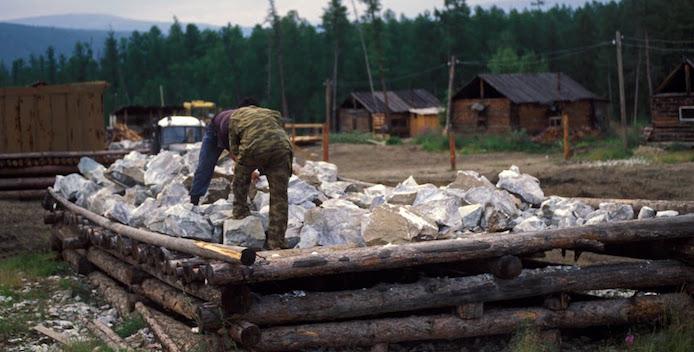
Baunt (Баунт) is a small settlement of about 30 individuals, located in Buryatia, to the northeast of Lake Baikal. Situated in the middle of the taiga forest, it is 50 km away from the nearest village, and 120 km from Bagdarin (Багдарин), the district’s largest centre (4500 inhabitants). This remote region is home to the Evenki and Orochen ethnic groups, who are reindeer herders and hunters. While geographically remote and peripheral Baunt is nonetheless an important site. It is home to a large deposit of nephrite, a type of jade not considered even semi-precious in Russia, but which attracts high value in China.
Research
The settlement of Baunt was chosen as a research site on account of its significance for the nephrite business. Because nephrite is highly prized in China where it is sold as jade (yet is not even considered a semi-precious stone in Russia), this region of Buryatia has become an important hub in recent years. Nephrite is exported out of Russia as a mere stone, to reappear some time later in Chinese stores as jade, where it fetches a high price. This little-known business illuminates another important connection between Russia and China, as well as their complex entanglement with respect to natural resources.
The research focus on Baunt and the surrounding region also provides a valuable diagnostic of interethnic relations between the region’s indigenous groups and the Russian majority. As some of the poorest ethnic groups in the Russian Federation, the Orochen and Evenki minorities in Buryatia have created vital links with Chinese companies and have seen opportunities flourish. We were interested in the links created between these Siberian groups and Chinese businesses, and in the complex trajectories followed by the stone.
Other important questions for this research concerned the ways in which indigenous communities manage transnational trade networks, and how they combine traditional activities (hunting, gathering or reindeer-herding) with nontraditional activities such as nephrite mining and trading. Part of the fieldwork was carried out in Moscow because it is where decisions are made concerning the nontraditional trade between East Siberia and Chinese regions involved with the jade industry. Building on many years of research in the region, anthropologists István Sántha and Tatiana Safonova used system theory to study the flow of jade to china and the flow of products to East Siberia, and foregrounded in their methodology the question of the posthuman, specifically the materiality of the stone itself.




